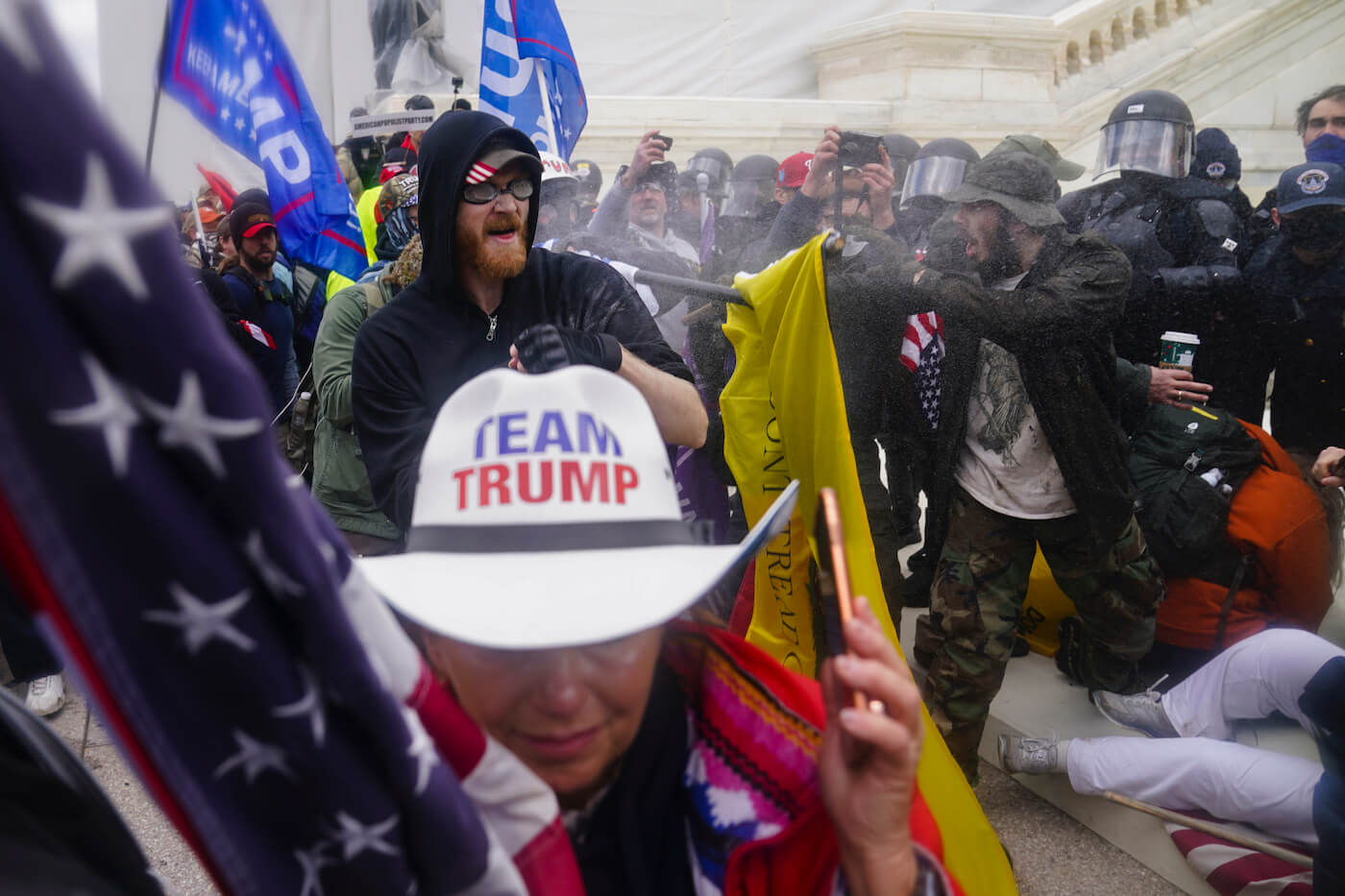
Trump supporters try to break through a police barrier, Wednesday, Jan. 6, 2021, at the Capitol in Washington. (AP Photo/John Minchillo)
One year ago, a mob of violent insurrectionists stormed the US Capitol, fueled with anger about fraudulent claims about Joe Biden’s win in the 2020 presidential election. It’s important to note that there were some Virginia lawmakers who had both a direct and indirect hand in the insurrection.
A year ago, a mob of violent insurrectionists stormed the US Capitol, angered by fraudulent claims about the legitimacy of Joe Biden’s win in the 2020 presidential election. Americans in Virginia and across the country watched in horror on Jan. 6, 2021, as supporters of former President Donald Trump smashed windows, scaled the outside of the building, and fought Capitol police in an effort to block the process that would certify Biden as the next president. Members of the House and Senate were evacuated, fearing for their safety. Some of the rioters chanted “Hang Mike Pence” for his role in presiding over the joint session of Congress.
As we look back at the tragic events of Jan. 6, which left five people dead, it’s important to remember who played a role, whether directly or indirectly, in the insurrection that aimed to overturn the election’s outcome. The attack was the culmination of months of lies about voter fraud and rigged elections from Trump and his allies in Congress—including some notable Virginia lawmakers. A US House committee investigation has already revealed an unsettling level of coordination between conservative activists, the Trump White House, and extremist members of the Republican House delegation.

What Happened in the Weeks Before the Attack?
During the 2020 presidential election, Biden easily won Virginia’s 13 electoral votes, as well as the popular vote, 54% to Trump’s 44%. For the most part, Virginia has been seen as a generally “blue” state. Regions in Northern Virginia have become more densely populated, with many voters leaning towards Democratic candidates, whereas voters in regions of Central and Southwest Virginia tend to lean more toward Republican candidates. The 2020 election—declared by Trump administration officials as “the most secure in American history”—was also the first time any presidential candidate received more than two million votes in Virginia.
Even before all the votes had been counted, however, some Republicans joined Trump in sowing lies and conspiracy theories about the integrity of the election. Virginia Congressman Ben Cline (R-Fincastle), for example, wrote to then-Attorney General William Barr on Nov. 6, citing unfounded “widespread reports of irregularities, particularly in the vote counting process.” He asked the US Department of Justice what they were doing to use their resources to “ensure the integrity of the voting and counting process.” He also asked them to remain committed to “ensure that only legal votes are being counted and being counted in a fully transparent way.”
Election officials across the commonwealth—including in Hanover County, which many consider a leader in election security in Virginia—have maintained there was no voter fraud and that the process was fair and transparent for everyone involved.
A day before the insurrection unfolded, Cline—who’s been in office since 2019—released a statement on his website saying the election was “riddled with an unprecedented number of allegations of irregularities and improprieties,” while going on to express concerns with and question the electors’ constitutionality.
What Happened in the Hours Before the Attack?
Fast forward to Jan. 6, 2021, where several Virginia Republicans and their associates were spotted either at the “Stop the Steal” rally, or had indirect ties to it. But what exactly was the “Stop the Steal” rally?
The phrase itself dates back to 2016, when Roger Stone, one of Trump’s longtime associates, used the term to dispute votes in urban or multiracial areas to also potentially intimidate nonwhite voters. From there, the phrase turned into a movement designed to pressure state and federal officials to overturn the results of the 2020 presidential election. The movement was promoted by several prominent Republicans including Trump himself, who tweeted weeks in advance about the event. The movement also encouraged Trump supporters and conservatives to head to the US Capitol on Jan. 6 to “storm the swamp,” based on social media postings.
That morning, Trump addressed the crowd of thousands: “We will never give up. We will never concede. It doesn’t happen. You don’t concede when there’s theft involved,” he said. “Our country has had enough. We will not take it anymore, and that is what this is all about.”
Virginia state Sen. Amanda Chase (R-Midlothian) also spoke at the rally, repeating false claims that the election was “stolen” from the former president. Although she was on her way back to the Richmond area when the violence broke out, she later referred to insurrectionists as “patriots.”
Those comments led to Chase being censured by Virginia State Senate officials in January 2021 for “fomenting insurrection against the United States.” She remains in office.
Another state lawmaker who not only appeared at the rally but also called on his constituents to join him was Del. Dave LaRock from Loudoun County. In the days after the siege, he posted unfounded conspiracy theories surrounding Biden’s Electoral College win, and also suggested there were “paid provocateurs” who infiltrated the mob that stormed the Capitol.
In a statement, LaRock described the rally that preceded the deadly attack as “an outstanding exercise of the right of the people peaceably to assemble, and to petition the government for a redress of grievances.” While he condemned the actions of the insurrectionists themselves, he also appeared to equate them with people who marched in support of racial solidarity and Black Lives Matter marches in the summer.
“The actions taken by rioters during this summer’s riots across the country were wrong, and so were the actions taken by those who stormed the U.S. Capitol today,” his statement read. (In fact, a large percentage of the BLM protests were actually peaceful, with tensions rising when police and counterprotesters got involved.)
Many constituents in LaRock’s district called for him to resign in the wake of the insurrection. However, he was re-elected to serve another term in Virginia’s House of Delegates in the 2021 election.
Del. John McGuire (R-Henrico) was also spotted at the rally, closer to the action than he’d let on.
Two officials associated with Republican Rep. Bob Good’s office were also spotted at the rally.
And although she was not in office at the time, newly elected state Del. Marie March (R-Christiansburg) also attended the Jan. 6 rally. The Roanoke Times reported that March said she went because her father wanted to hear Trump speak, adding that she saw nothing wrong with showing support for a former president.
“You’ll never take back our country with weakness,” Trump said during the rally, riling up the crowd just before the violence began. “You have to show strength, and you have to be strong. If you don’t fight like hell, you’re not going to have a country anymore.”
March’s two-year term begins on Jan. 22.
The Aftermath of the Insurrection
After police and National Guard reinforcements broke up the violent mob and the halls of Congress were deemed safe once again, lawmakers returned that same evening to finish certifying Biden’s victory. Despite the chaos, some Trump loyalists continued on with their efforts to challenge the results.
Cline, Good, and fellow Virginia Reps. Rob Wittman (R-Montross) and Morgan Griffith (R-Salem) voted against certifying the election in favor of Biden. Despite their efforts to undermine the will of Virginians, all four lawmakers are still serving in Congress.

A day after the Capitol attack, Good released a statement on his reasons for challenging the electoral votes from six states: “This is about more than the 2020 presidential election; it is about all future elections and Congress doing its constitutional duty to ensure election integrity and to not accept electoral submissions from states with sufficient evidence of fraud, which warrants full investigation, as well as states where legislators did not ensure the law was followed or ensure the integrity of their elections.”
Later, Good also voted against honoring the Capitol and Metropolitan Police forces who helped protect lawmakers and others in the Capitol building on Jan. 6.
READ MORE: ‘Coups Don’t Always Happen the First Time’: Why the Next Version of Jan. 6 Could Succeed
Politics

It’s official: Your boss has to give you time off to recover from childbirth or get an abortion
Originally published by The 19th In what could be a groundbreaking shift in American workplaces, most employees across the country will now have...

Trump says he’s pro-worker. His record says otherwise.
During his time on the campaign trail, Donald Trump has sought to refashion his record and image as being a pro-worker candidate—one that wants to...
Local News

Virginia verses: Celebrating 5 poetic icons for National Poetry Month
There’s no shortage of great writers when it comes to our commonwealth. From the haunting verses of Edgar Allan Poe, who found solace in Richmond's...

Join the fun: Recapping Family Literacy Night’s storybook adventures
When’s the last time you read a book aloud with a loved one? If it’s difficult to answer that question, then maybe it’s time to dust off that TBR...





